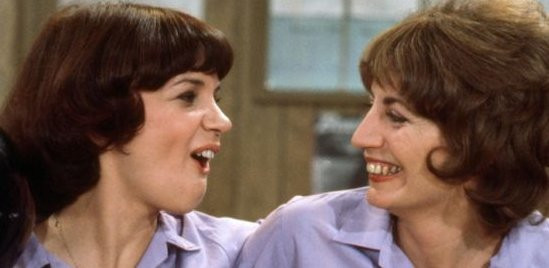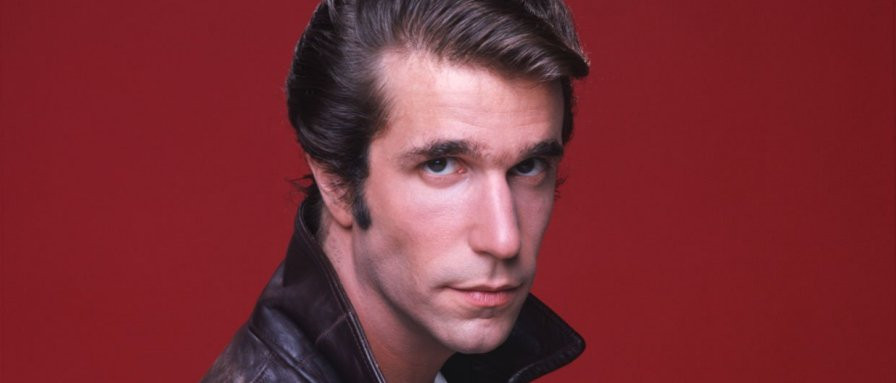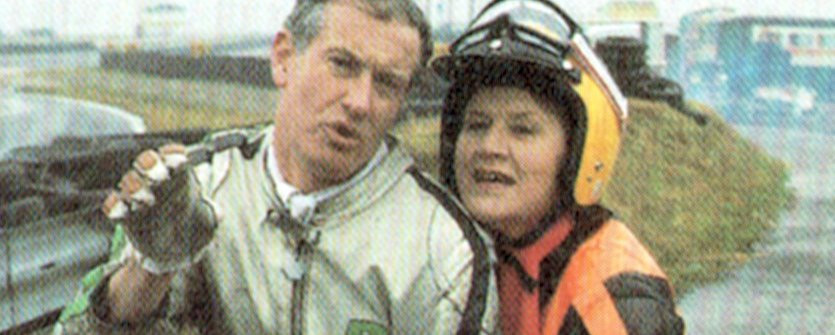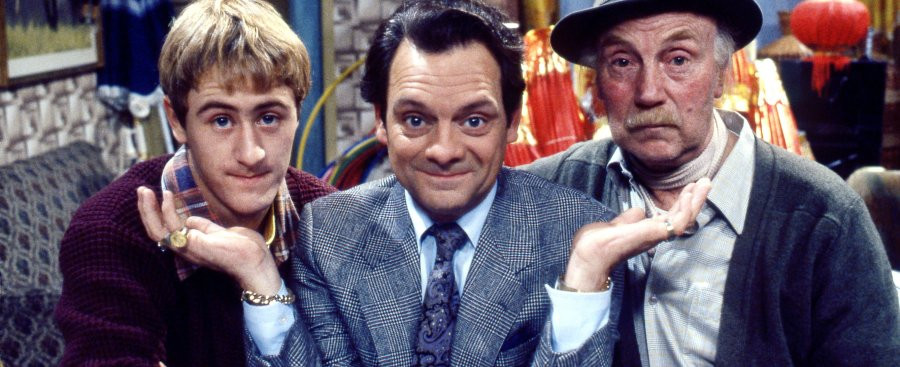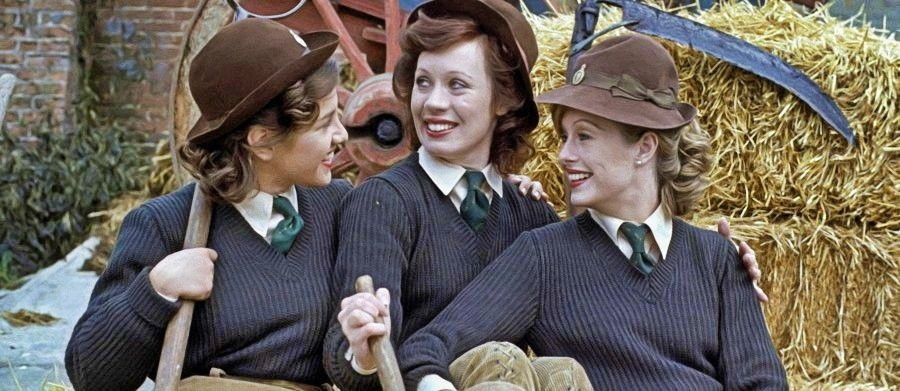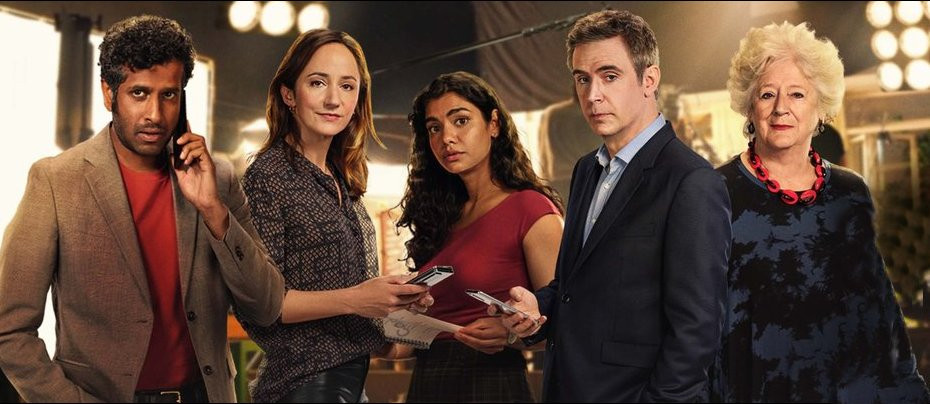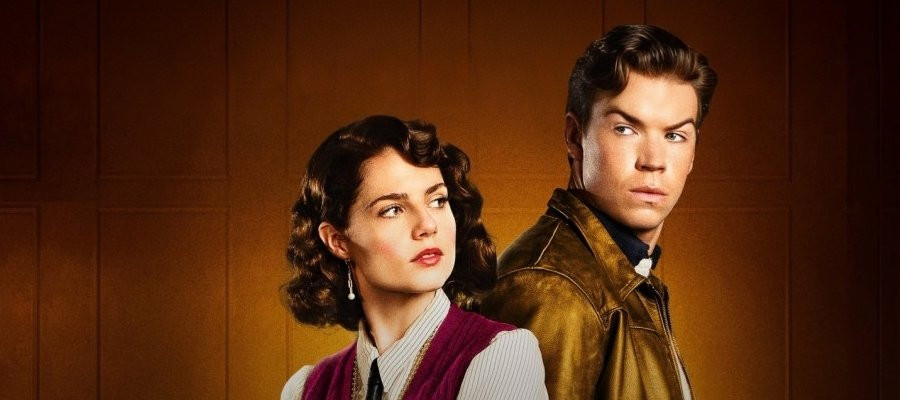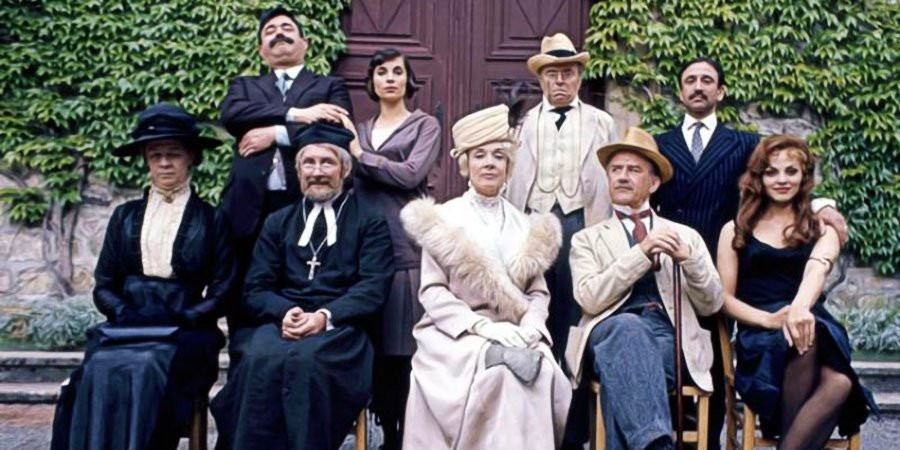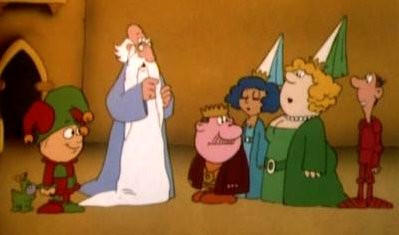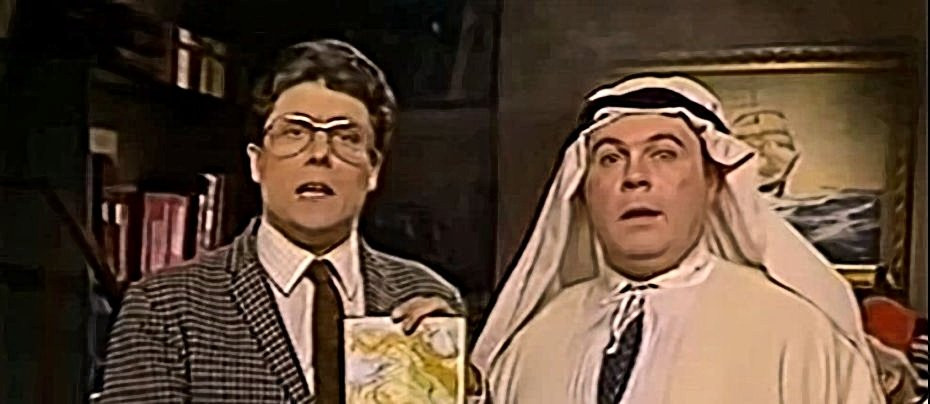
Mighty Moments From World History
1985 - United Kingdom“the comic emotional scenes are sometimes genuinely moving after all”
Mighty Moments From World History reviewed by John Winterson Richards
One of the many joys of writing for this website is that it offers the opportunity to draw attention to shows that were unfairly overlooked when they were first aired, or have been unfairly neglected since, or both, and that deserve to be better known. Few projects are as worthy of such rediscovery as the National Theatre of Brent and its Mighty Moments From World History.
Sorry to have to begin by breaking this to you, but it needs to be made clear the National Theatre of Brent is not a real National Theatre. It is ostensibly the brainchild of one Desmond Olivier Dingle, its "Founder, Artistic Director, and Chief Executive." Dingle evidently sees it as his mission to edify and educate the masses by dramatising his own rather individual take on important historic and cultural events.
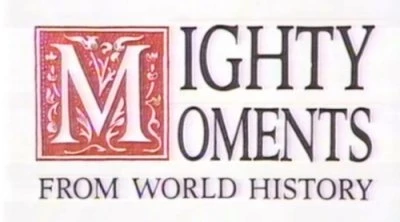
As its name suggests, the National Theatre of Brent started out as a stage company... Well, we say "company" but it consists of exactly two people, Renaissance Man Dingle himself and a single all purpose Assistant. Despite the NTB's grand title it presents the image of being more than a little strapped for cash in every department. The production values are literally laughable and Dingle obviously has to take what he can get in the way of Assistants.
His noble endeavour also suffers from the fact that Dingle is not as multi-talented or as intelligent as he likes to think, or as cultured or as well read as he likes to pretend.
Yet it takes more than that to keep a good man down. With typical energy and self-delusion, Dingle soon expanded his operations by setting up a National Theatre of Brent "Television Unit" - in fact the same two men. The Television Unit's most epic production to date is the short series which Dingle, with his usual modesty, titled Mighty Moments From World History.
All this is, of course, an elaborate joke - the foundation joke of the whole NTB project, that the ambition of the production is inversely proportional to the talent and resources available.
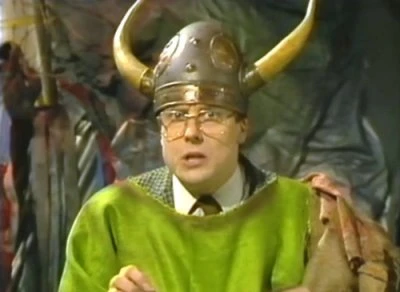
Dingle himself is in turn the brainchild of Patrick Barlow, an experienced and hardworking comedy actor, whose face, if not necessarily his name, is probably familiar to television viewers from supporting roles in the likes of French and Saunders and Absolutely Fabulous, and to filmgoers from fairly brief appearances in the likes of Shakespeare in Love and Notting Hill.
The NTB is his real masterwork. He has developed it over forty years, mainly on stage and on radio, venturing only occasionally on to the small screen. Over that time, he has had a number of different Assistants, including Jim Broadbent, Robert Austin, and John Ramm.
The NTB really is true to its name in that it started as a theatrical act and it has probably enjoyed its greatest success on the stage, with multiple productions and an Olivier Award nomination. Even in its television form it retains a deliberately theatrical feel to it and the audience participation elements are often the best parts.
With its usual bravado, the NTB started at the top in television with 'Messiah,' its singular version of the Life of Christ. Dingle, played by Barlow, took on multiple roles, as did his Assistant, at that point "Wallace," played by the up-and-coming Jim Broadbent.
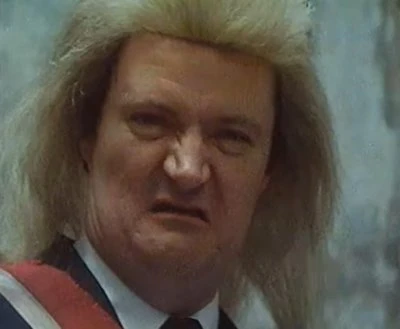
By the time Mighty Moments From World History appeared two years later, Broadbent 's career was beginning to take off, so Dingle's Assistant was now "Bernard" - actually Bernard Wilson as we discover later - played by Robert Austin.
The premise of Mighty Moments From World History is that it presents the whole story of Mankind, but, as ever, Dingle's imagination is greater than his means and we end up with his rather eclectic choice of individual episodes, from the Dawn of Man through Boudicca and King Arthur to Lawrence of Arabia.
Each episode opens with an impressive fanfare and titles sequence that seems to be referencing the early episodes of the prestigious BBC Shakespeare that was then being produced - except here done on the cheap, setting the tone for what follows.
Dingle is part pompous actor-manager in the Sir Donald Wolfit tradition, part tortured artist, part earnest academic, and part self important Sixties BBC reporter of the type much satirised by the likes of Monty Python and Griff Rhys Jones. Somewhat self consciously, he wants to project the image of the Great Thinker, but he cannot sustain it. The mask keeps slipping, at which points the high flown language of the pseudo-intellectual gives way to Greater London demotic in the manner of the 'Carry On' films and Frankie Howerd's 'Up' projects.
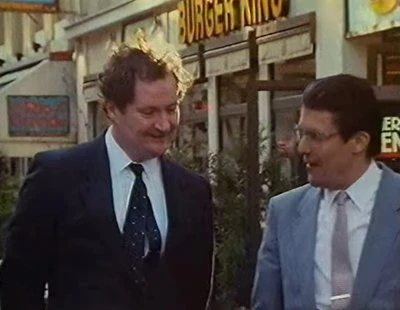
Barlow pitches it exactly right, at his best when Dingle is humiliated in some way and we find some unexpected sympathy for the character. Yet he is often upstaged by Austin as Bernard. Austin is blessed with a pleasant, open expression and wide eyes which, combined with premature baldness, give him the air of an innocent child. He is also childlike in his manner: Bernard, left to himself, is what in the Eighties might have been called "a bit slow" - no doubt there is some more modern euphemism now which somehow makes it sound even worse.
However, when playing different roles in the plays within the play, Bernard sometimes accesses a more mature part of himself he does not know existed. He - or rather Austin - is actually a rather good dramatic actor when playing, say, Winston Churchill or an arrogant sabre tooth tiger as a normal adult. The only false note is a scene in which Bernard loses his temper and Austin plays Bernard himself, rather than Bernard playing a character, as a rather angry grown up. The spell is broken and we can never quite see Bernard in the same way after that.
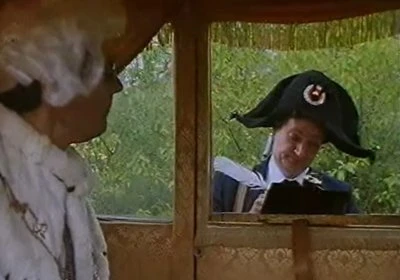
This is a double pity because Bernard/Austin is at his best in scenes which manage to deliver a fair amount of pathos, if not actual poignancy. Those are also often the best written because they offer us several layers of irony. On one level, we are invited to laugh at bad actors who think their bad performances will have a deep emotional impact. However, it is truly said that it takes a good actor to play a bad actor, and both Barlow and Austin prove this repeatedly. They would have been great "rude mechanicals" in 'A Midsummer Night's Dream.'
As a result, the comic emotional scenes are sometimes genuinely moving after all, especially when they access the inner truth of their subject matter - the loneliness of Lawrence of Arabia, the despair of Boudicca, the disappointment of King Arthur - with an honesty that might not be available in a more deliberately dramatic performance.
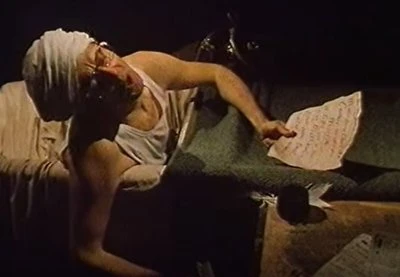
For perhaps the greatest irony is that, while Dingle is not as well read or cultured as he likes to pretend, the same cannot be said of Barlow and his colleagues writing Dingle's lines. The script is full of knowing references which show that someone has done their research - even if the way they come out suggest that Dingle has been far more superficial. For example, Dingle takes the wholly unsubstantiated legend that Boudicca is buried under what is now King's Cross station as fact - except he gets the station wrong, so they end up filming at Paddington: however, this works out well because Dingle needs to catch a train to Reading.
So NTB is really one big circular joke: a very intelligent man pretending to be an idiot pretending to be a very intelligent man.
To be honest, the joke does wear a little thin in places. Some scenes go on far too long, and sometimes the changes in tone leave the viewer a bit uncertain. A running gag about guest artists adds little. The whole thing could certainly have been a lot tighter. Against that, the experimental nature of the whole project delivered some great moments, the dialogue is genuinely witty to a level rarely heard anymore, and the surreal bits, like the sabre tooth tigers discussing why Man is an evolutionary dead end, really ought to be classics. There is a definite sense of joy and spontaneity to the segments with a studio audience - which were very much in vogue in television comedy at the time, but which often fell flat where neither the actors nor the material had been tested by experience on stage, the NTB's theatrical roots proving a crucial advantage. At the same time, some clever location work opened up the stage production nicely.
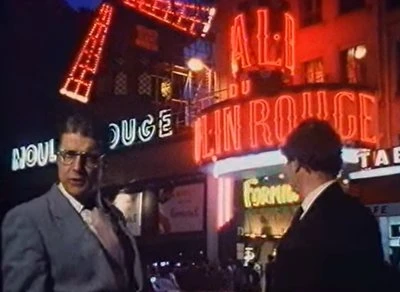
This last aspect was developed considerably four years later when NTB returned to television in Revolution, a fairly prestigious "one off" as part of the official commemoration of the Bicentenary of the Fall of the Bastille. In contrast to the ostentatious cheapness of Mighty Moments From World History, a lot of money was obviously spent on impressive locations in France and the return of Jim Broadbent, by then well established and on the verge of stardom, as Dingle's Assistant. Broadbent is predictably superb, but one cannot help missing Bernard - or wondering what happened to Robert Austin: he has been active in a number of projects, not least delivering one of the best lines in Chelmsford 123, but so far nothing that makes the most of the potential he demonstrated in Mighty Moments From World History. One might wonder the same about NTB itself, at least as far as television is concerned - it enjoyed further success on stage and on radio, but Mighty Moments from World History proved that it could translate well to the small screen and it would have been fun to see more of Dingle's great vision there.
Seen this show? How do you rate it?
Seen this show? How do you rate it?
Published on August 18th, 2022. Written by John Winterson Richards for Television Heaven.


